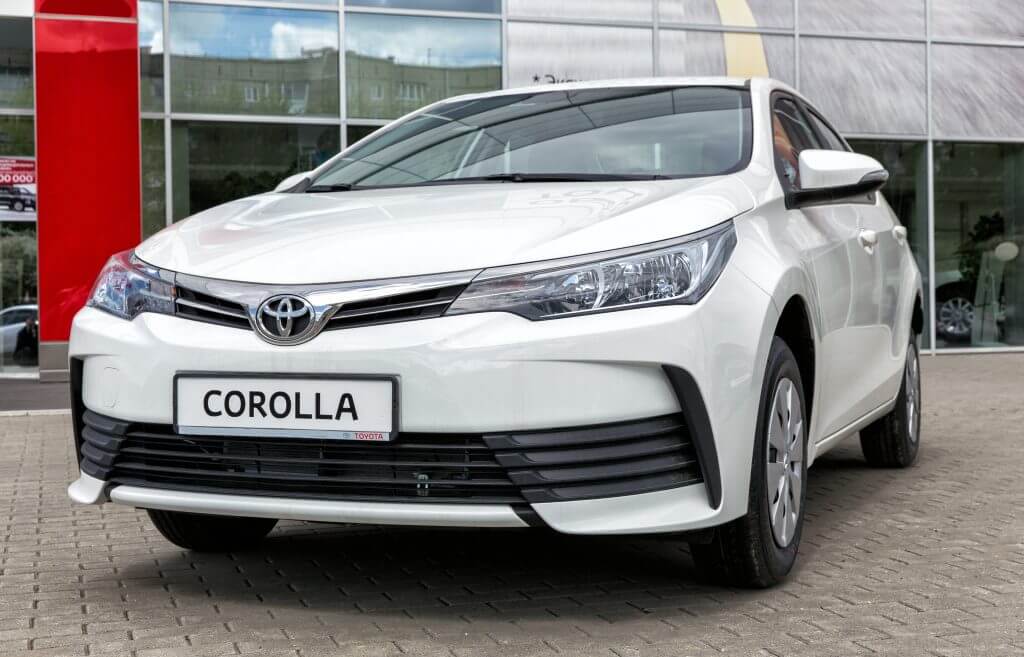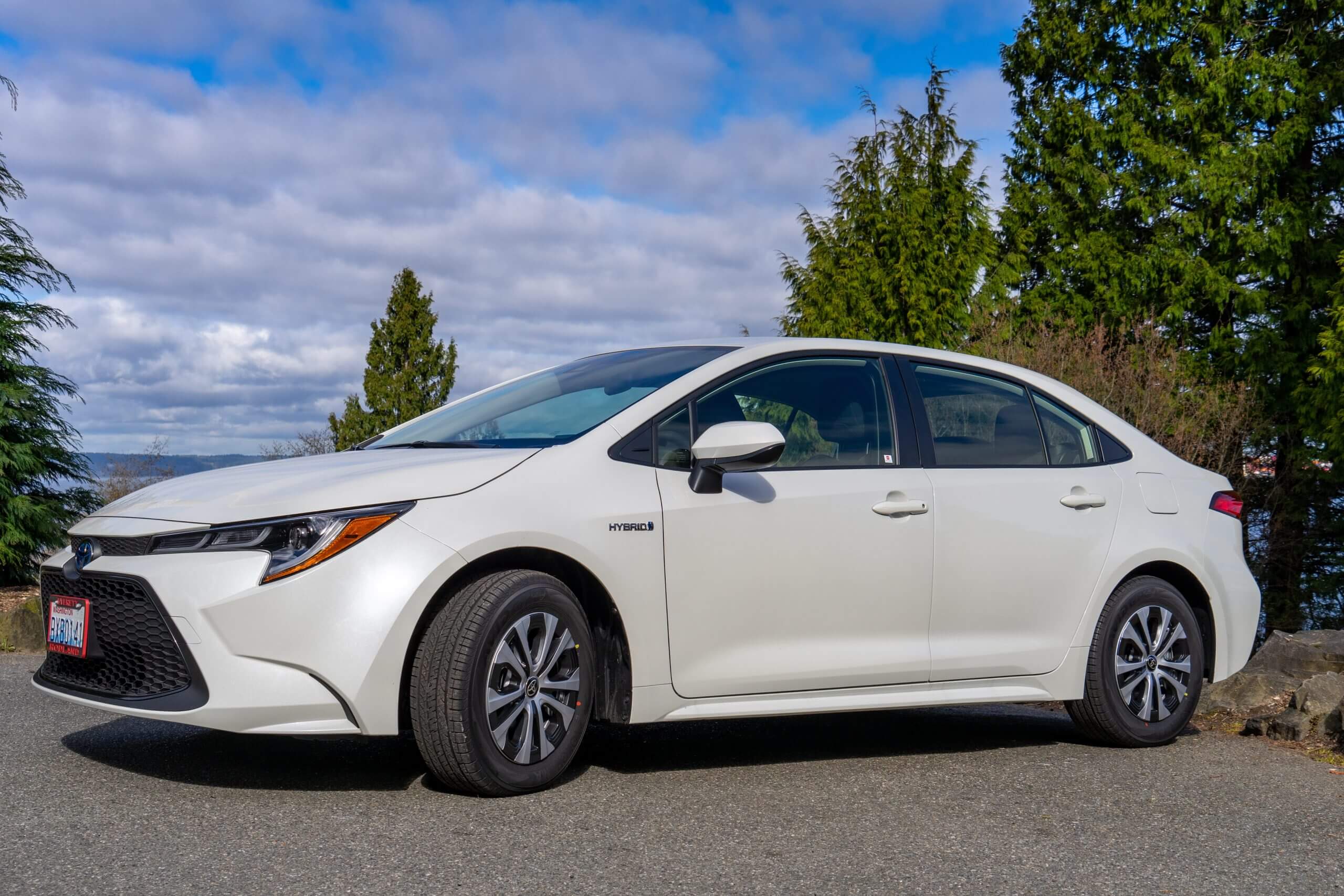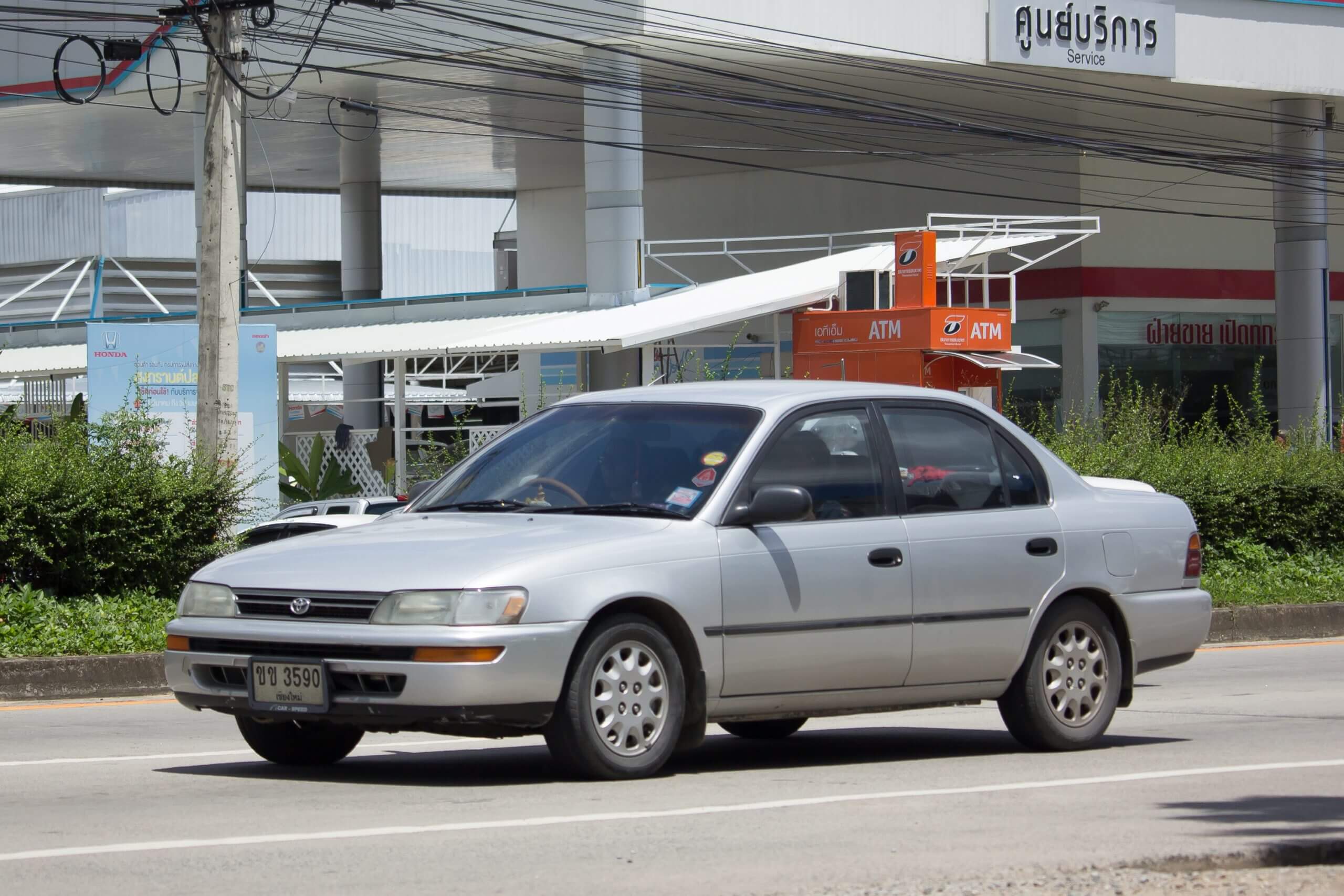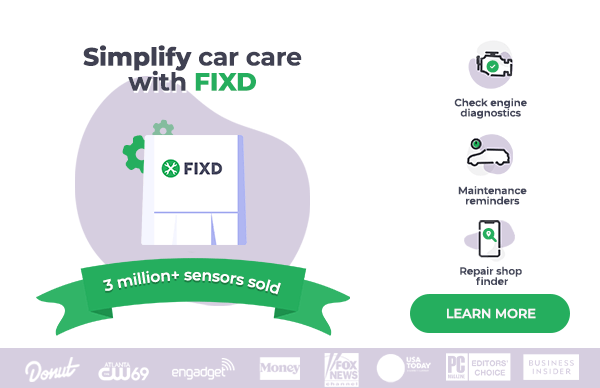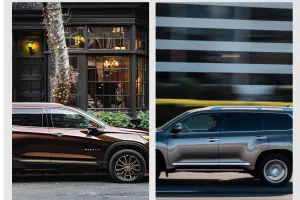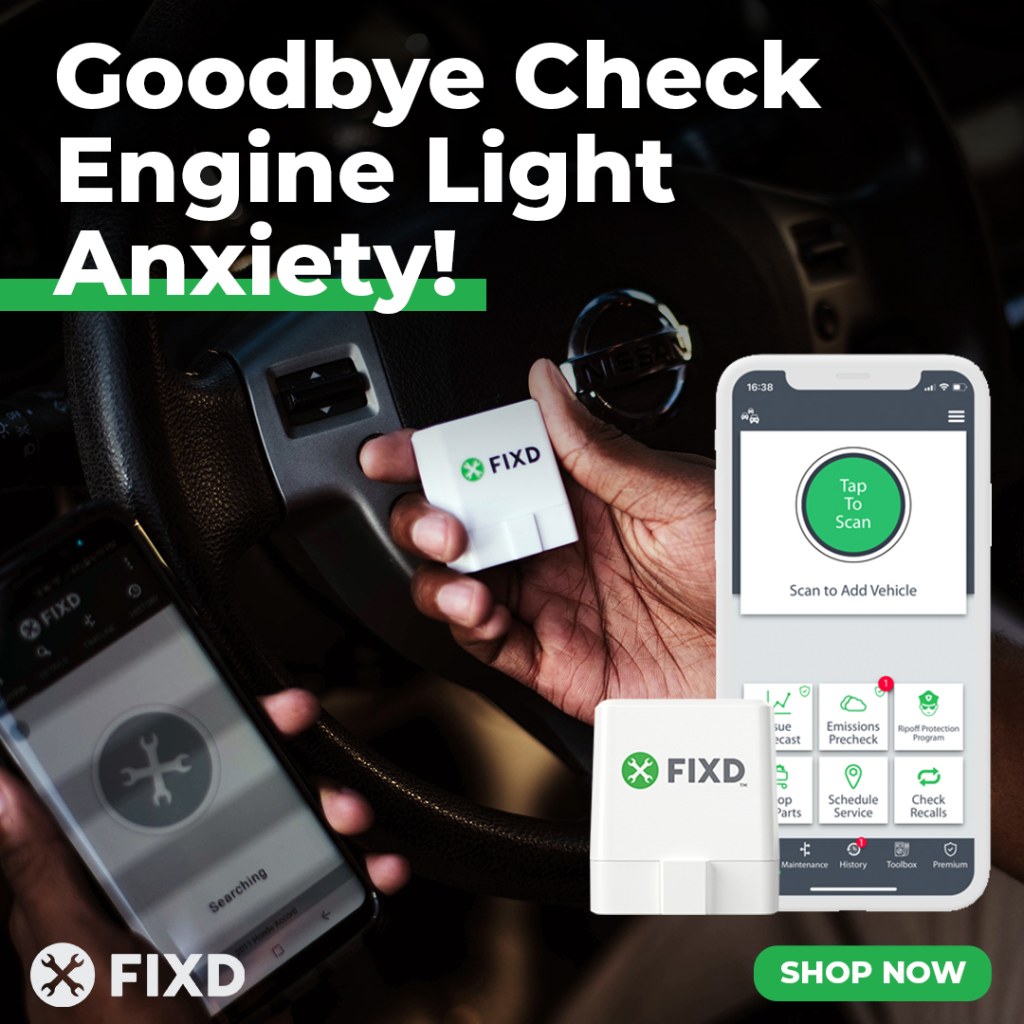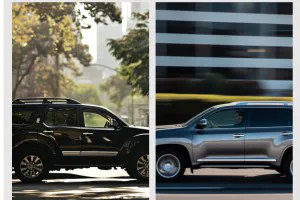Meaning “little crown” in Latin, the Corolla is the crown jewel of the Japanese automaker’s lineup and will be a popular vehicle for years.
Toyota has sold over 50 million Toyota Corollas. First introduced in 1966, it became the best-selling car in the world in 2021. It is one of the most affordable and versatile vehicles on the market. Most commonly sought as a family vehicle or commuter car, the Corolla has consistently satisfied consumers with its dependability and great features.
The Toyota Corolla has won numerous value, safety, and dependability awards. However, there are still some model years that we would not recommend buying.
We sifted through numerous data sources to create an extensive report on the best and worst years of the Toyota Corolla. We created this assessment using data that our FIXD scanners collected from Toyota Corollas and directly from Corolla owners via surveys. We also use public sources regarding safety (NHTSA.gov), fuel economy (fueleconomy.gov), and resale value (KBB.com).
Here is a quick synopsis of our results: (followed by a detailed analysis of the Toyota Corolla’s best and worst years.)
| Best Years | Why? | Worst Years | Why? |
|---|---|---|---|
| 2010-2012 |
High reliability scores, low number of DTCs |
1996 |
27 years old, low safety rating, spends up to 3 days in the shop |
| 2013-2015 |
High safety rating, flawless generation switch, low repair costs |
2000-2002 |
Low owner reliability score, disliked entertainment center, low safety rating |
| 2016-2019 |
High owner reliability, low cost to maintain, high value, excellent MPG |
2005-2006 |
Lowest MPG of all years, lots of recalls |
| 2021 |
Perfect reliability scores, high safety ratings, low maintenance costs |
2009 |
First model of 10th generation, many DTCs, low safety ratings |
If you’d like to see an in depth comparison of this vehicles competitors, check out:
Toyota Corolla Vs Honda Civic
Toyota Corolla Vs Toyota Camry
Toyota Corolla Vs Honda Accord
Toyota Corolla Vs Nissan Altima
Toyota Corolla Vs Nissan Sentra
Toyota Corolla Vs Volkswagen Jetta
Toyota Corolla MPG, Engine Reliability Score, & Safety Ratings Year by Year
Before breaking down the best and worst years of the Toyota Corolla, let’s look at some of the most significant factors contributing to whether or not you should buy some years of the Corolla.
We’re going to cover the engine reliability score (FIXD Reliability Score), the NHTSA safety score, the fuel economy, and the market value v.s. annual repair costs.
The information following will be helpful if you’re looking to buy or sell one of these vehicles.
If you’re in the market for a car, take a look at our article on the USAs’ most reliable and cheapest to repair cars in the U.S. Don’t get stuck with a lemon, use our data to help you shop.
Toyota Corolla Engine Reliability Score – Over The Years
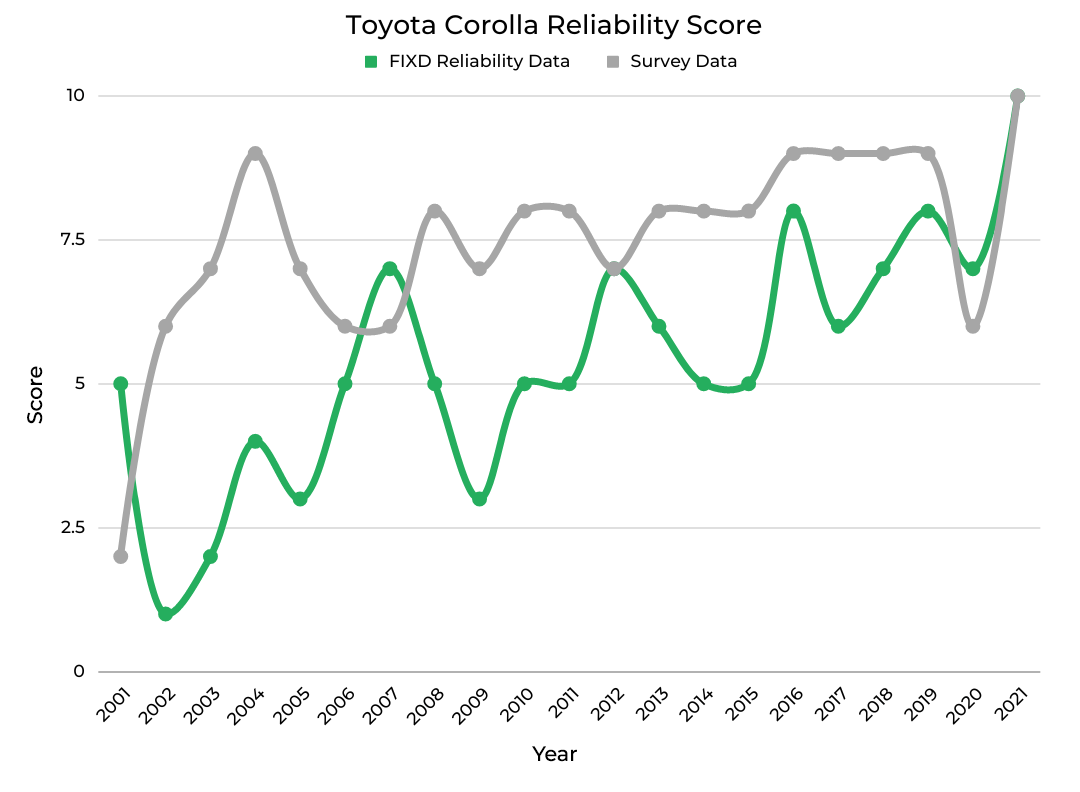
We determined the reliability scores for the Toyota Corolla in two ways.
The green line is our FIXD Reliability Score which uses data collected directly from the Toyota Corolla years shown on the graph via our app and sensor. This score is based on how many check engine lights were triggered for each model year. We wrote an article on the common causes of Toyota Check Engine Lights if you’d like to take a look, we cover repairs and repair costs for most Toyota models too.
The gray line is the data collected from Toyota Corolla owner surveys. This is useful to compare against the FIXD Reliability Score to confirm the FIXD score or draw conclusions about the severity of the check engine lights that owners may have encountered.
Both the FIXD and owner scores are based on a relative scale of 1-10, 5 being average, 10 being the best, and 1 the worst.
You can see by the graph that the newest Corolla’s are unsurprisingly the most reliable, but there is a noticeable dip in reliability for the 2020 model. Several models over ten years old have good reliability scores, such as 2010-2012 and the 2013.
However, according to Corolla owners, avoid the 2001 model at all costs. The 2000, 2002, 2003, 2005, and 2009 model years are also a couple of bad years for reliability.
As you look at the reliability chart, remember that the first year of a generation of any car model is typically all new with all new problems. Reliability is usually expected to tank in the first year of a generation.
Every time your CEL goes on, a Diagnostic Trouble Code (DTC) is generated. These help the mechanic determine what’s wrong with the engine. If you’re curious, we put together a cheatsheet with the Top 5 DTCs (& what they mean) for the top Toyota models.
Toyota Corolla NHTSA Safety Score – Over The Years
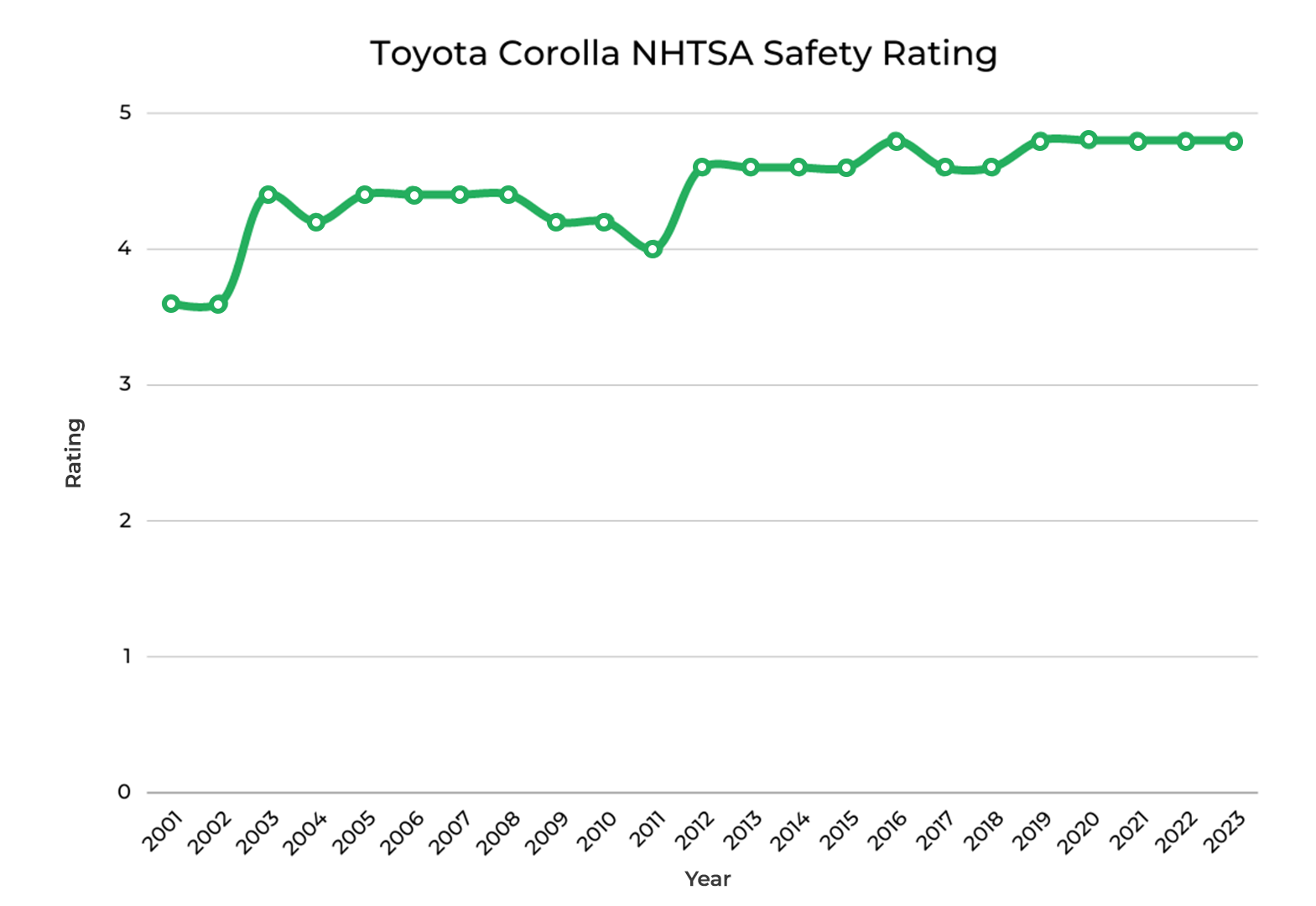
The Toyota Corolla is primarily used for extended driving, with 43.58% of FIXD app users using theirs for travel or commuting. Another large percentage of Corolla owners use it as a family vehicle, which means safety is essential to the overall ranking of best and worst cars by year.
Look at the safety data from the National Highway Transportation Safety Administration (NHTSA). The Toyota Corolla has scored above 4 out of 5 for the last 20 years. One of the best years to own, the 2016 model, has an overall score of 4.8 out of 5.
Compared to the same year model, the Honda Civic has a perfect score of 5, while the Nissan Sentra has a 4.4. You’ll find the Toyota Corolla is often one of the top cars in its category regarding safety.
The above-average safety rating of the Toyota Corolla is welcome news if you’re shopping for car insurance. The safety of your vehicle is a significant factor in your insurance costs, and having a car with excellent safety ratings will help you get cheaper insurance rates.
If you live in one of the states listed below, we can show you the most affordable vehicles to insure in yours.
| What Used Cars Are the Cheapest To Insure In: |
|---|
| Ohio |
| North Carolina |
| Michigan |
| Georgia |
| Texas |
| New York |
| Illinois |
| Pennsylvania |
| California |
Toyota Corolla MPG – Over The Years
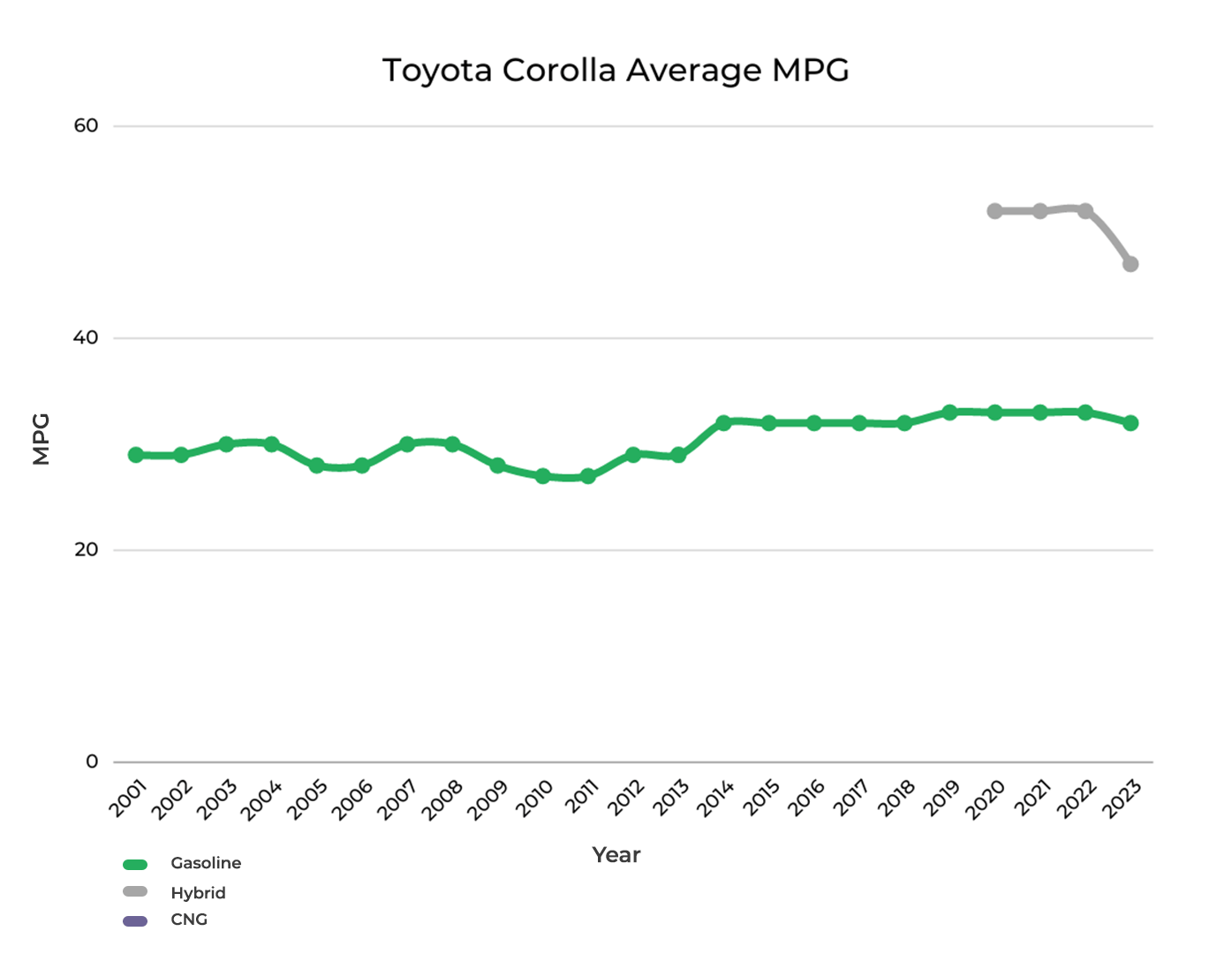
While fuel efficiency wasn’t a standout feature of early Corolla models, recent versions have significantly improved. The twelfth generation of the vehicle introduced the Corolla Hybrid, marking a turning point for the model’s fuel economy with a combined rating of 52 mpg.
Even non-hybrid Corolla models have seen improvements in fuel efficiency in recent years. The 2019-2022 Corollas, for example, boast an average fuel economy of 33 mpg, well above the average for light-duty vehicles. Toyota has achieved this by equipping the latest Corolla models with an efficient continuously variable transmission (CVT) and a 1.8-liter engine.
Overall, the Toyota Corolla offers a combination of reliability and fuel efficiency, making it a smart choice for car buyers who value these qualities.
Recalls of Interest & Factory Warranties (Years we could find info online):
2001 Toyota Corolla Factory Warranty & Recalls – All Coverage & Exceptions
2002 Toyota Corolla Factory Warranty & Recalls – All Coverage & Exceptions
2003 Toyota Corolla Factory Warranty & Recalls – All Coverage & Exceptions
2004 Toyota Corolla Factory Warranty & Recalls – All Coverage & Exceptions
2005 Toyota Corolla Factory Warranty & Recalls – All Coverage & Exceptions
2006 Toyota Corolla Factory Warranty & Recalls – All Coverage & Exceptions
2008 Toyota Corolla Factory Warranty & Recalls – All Coverage & Exceptions
2009 Toyota Corolla Factory Warranty & Recalls – All Coverage & Exceptions
2010 Toyota Corolla Factory Warranty & Recalls – All Coverage & Exceptions
2011 Toyota Corolla Factory Warranty & Recalls – All Coverage & Exceptions
2012 Toyota Corolla Factory Warranty & Recalls – All Coverage & Exceptions
2013 Toyota Corolla Factory Warranty & Recalls – All Coverage & Exceptions
2014 Toyota Corolla Factory Warranty & Recalls – All Coverage & Exceptions
Current Market Value of All Toyota Corolla Years & Cost Per Year to Repair and Maintain Each
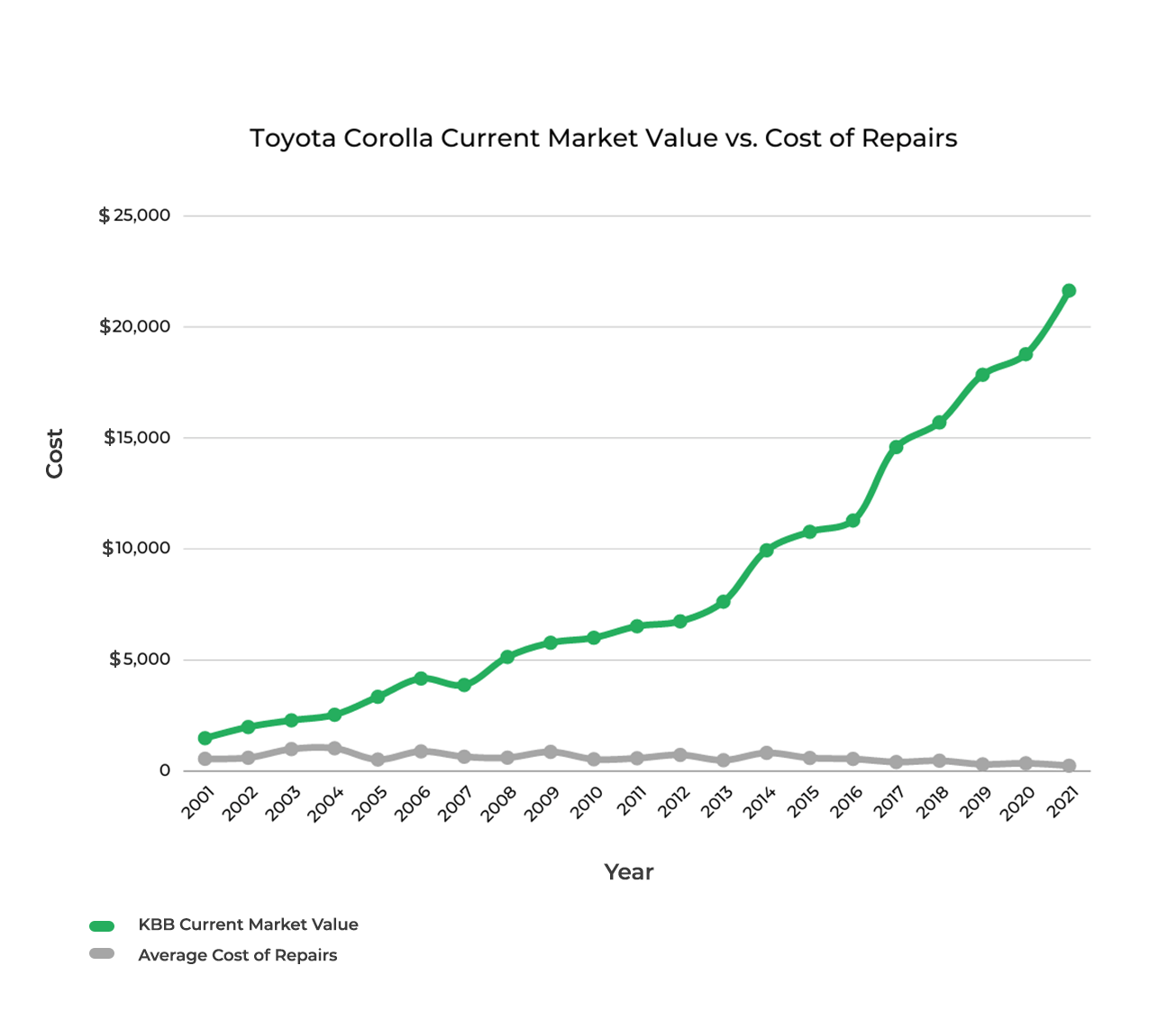
We considered the current market value and cost to repair each model year as we listed our best and worst years of the Toyota Corolla.
The green line in this graph shows KBB’s current market value for each year, while the gray line indicates the average cost of repairs yearly. The Toyota Corolla has consistent repair costs and above-average Kelley Blue Book value for similar vehicles.
The current market value increases with new year models as expected.
New car models have annual repair and maintenance costs as low as $250, while model years between 10 and 20 years old have costs between $500 and $850. You can see in the graph that the price of repair and maintenance took a dip in 2005 and stayed significantly low throughout the car’s life.
If you’d like to learn about this vehicle’s past depreciation rate & our projected depreciation rate based on that, check out: Toyota Corolla | Depreciation Rate & Curve Graphed
When shopping for a used Toyota Corolla, it’s important to keep in mind that not all vehicles are cared for equally. To protect yourself from lemons, take along a FIXD Sensor on your test drive. FIXD connects to a free app on your smartphone to tell you more about the vehicle you’re checking out, including check engine lights and other hidden issues that the owner or dealership may be attempting to hide. Click here to learn more and get FIXD for only $19.99 (regular price $59)!
Important Features Timeline
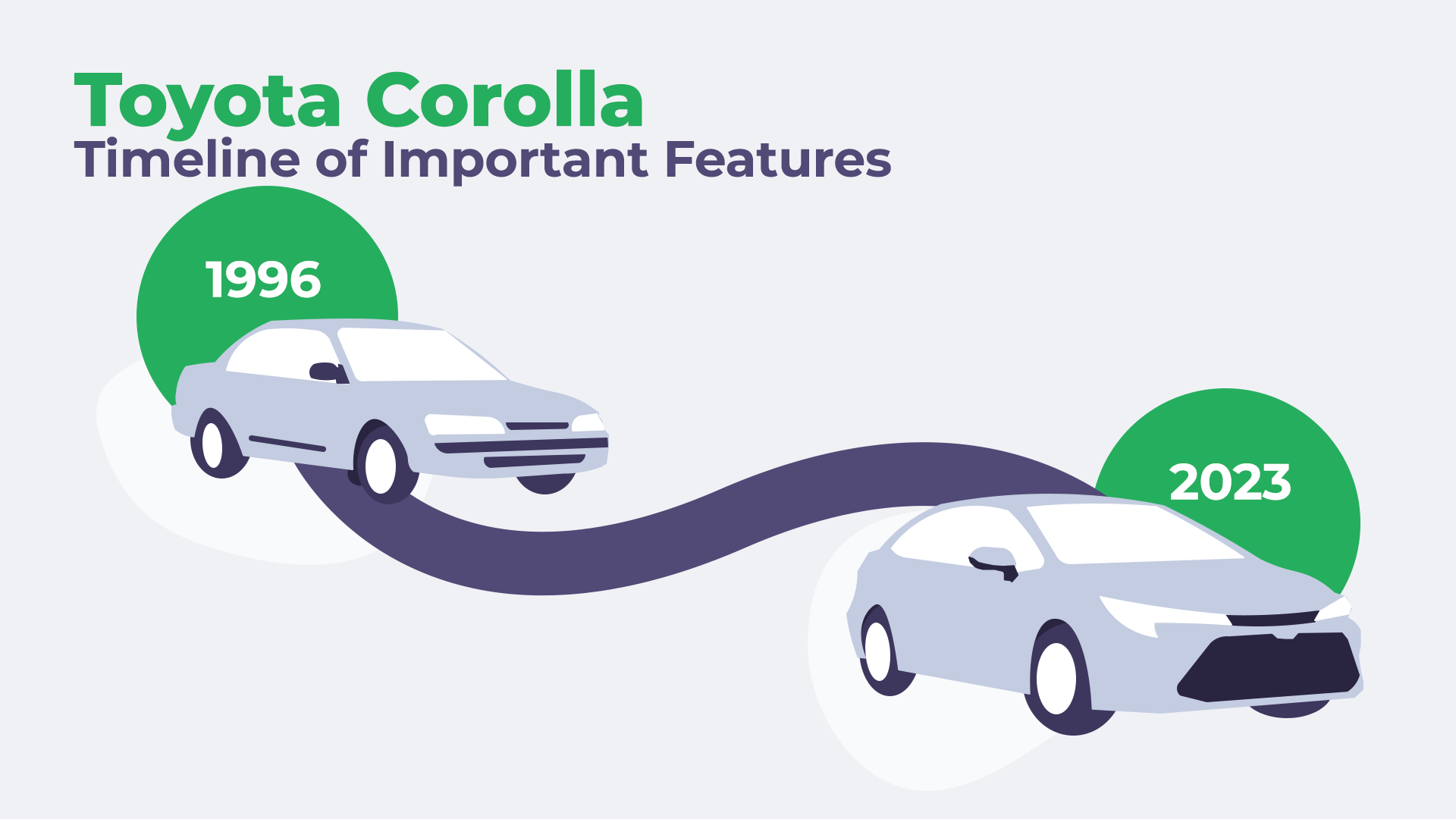
1996: Redesigned exterior and interior styling
1997: Improved safety features like dual safety airbags became standard
1998: Introduction of the new 1.8L engine
1999: Unique interior and exterior colors, updated suspension for better handling
2000: Low emission vehicle status, increased horsepower from VVT-i technology
2001: Internal trunk release added, and fresh/recirculate button for the ventilation system
2002: Introduction of Sporty S model trim with unique exterior styling
2003: Complete redesign. CD player, power windows, and mirrors come standard. Another increase in horsepower
2004: No significant changes since the previous year’s complete redesign
2005: Introduction of a new XRS model with a 170 horsepower engine and a six-speed manual transmission
2006 : Improved sound system, no significant changes
2007: Side airbags standard
2008: Last model of the 9th generation, no substantial changes from previous years
2009: Introduction of the 10th generation, 2.4-liter engine, and navigation available
2010: Standard electronic stability and traction control in all models
2011: Revised exterior styling, flat think-bottomed steering wheel
2012: The base model comes with standard power accessories
2013: Standard Bluetooth connectivity, optional touchscreen entertainment center
2014: Introduction of 11th generation, rearview camera standard in all models
2015: Redesigned just last year, adds fold-down rear center arm rest
2016: Toyota Safety Sense standard, refreshed exterior and interior
2017: New grille and LED headlamps in front, Introduction of 50th Anniversary Special Edition model
2018: Improved interior materials and sound insulation, relatively unchanged from previous year
2019: Apple CarPlay standard, introduction of Nightshade edition
2020: Introduction of the hybrid model
2021: Standard Android Auto smartphone integration
The Best Years of the Toyota Corolla
After analyzing the data, the best years of the Toyota Corolla are listed below, starting with the highest rated. We determined the ranking by comparing theFIXD Reliability Score, the Owner Reliability Score, safety scores, fuel economy, KBB value, and maintenance and repair costs. We’ve also gone over some common diagnostic trouble codes (DTC) and recall information that would be helpful for potential Corolla owners.
2021 Toyota Corolla
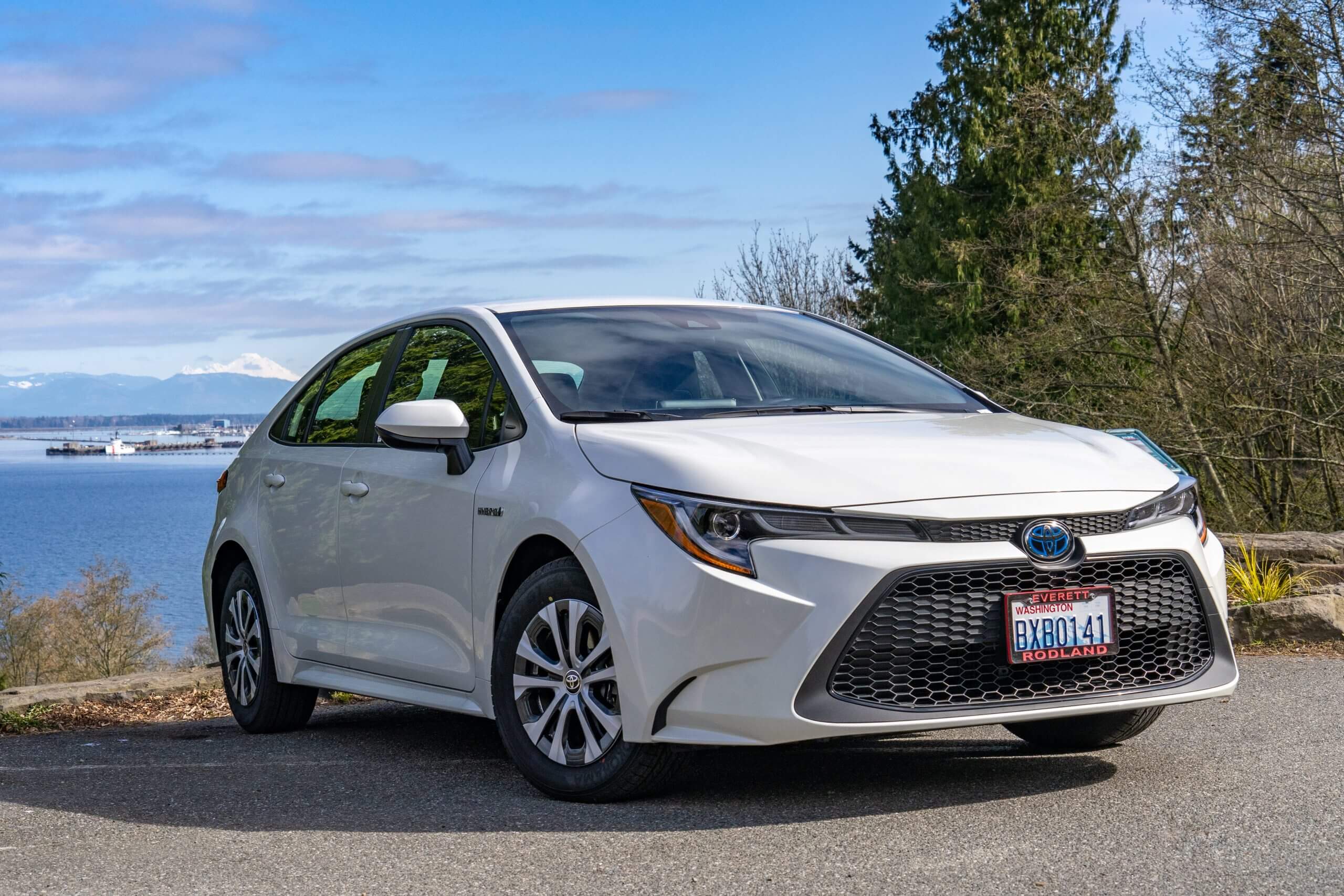
FIXD Reliability Score: 10/10
Owner Reliability Score: 10/10
KBB Value: $21,636
Fuel Economy: 33 mpg
Annual Maintenance/Repair: $250
Safety Rating: 4.8/5
The best Toyota Corolla on our list is the newest for which we have adequate data. 2021 is the second model in the 12th generation, and customers seem happier with it than the previous year. While most 2021s still have low mileage, it is the only Corolla in our report with a perfect 10/10 score, both from our FIXD devices and customer surveys.
The 2021 Corolla has a 5-star safety rating, and it is an excellent choice for families or people that plan to be on the road for extended periods of driving. It received five stars in overall front and side ratings, with a 4 out of 5 in the rollover rating.
The 2021 model boasts only $250 annual repair and maintenance costs, mainly due to regularly scheduled maintenance such as oil and filter changes.
The most common DTC code when the check engine light does come on is Random Multiple Misfire Detected, P0300, which can indicate a misfire in one or more cylinders. DTC P0300 may mean spark plugs need replacing, costing $66-$250. The code has appeared in only a few vehicles, and the data will improve as these cars reach mileage milestones.
Another DTC light is P2196, O2 Sensor Signal Stuck Rich (Bank 1, Sensor 1). This code may require an oxygen sensor replacement, which can cost $155 to $500.
According to the NHTSA, this car has not had a single recall since it has been on the market (as of March 2023).
2016-2019 Toyota Corolla
FIXD Reliability Score: 6-8/10
Owner Reliability Score: 9/10
KBB Value: $11,286-$17,849
Fuel Economy: 32-33 mpg
Annual Maintenance/Repair: $250-$900
Safety Rating: 4.6-4.8 / 5
The Toyota Corolla model years from 2016 to 2019 belong to the 11th generation. These years bring more dependability to the Toyota lineup, with great fuel economy and safety ratings.
Owner surveys show they are highly reliable at 9 out of 10. However, the FIXD score fluctuates from 6 to 8 out of 10. These scores are above average and among the highest of all Toyota Corollas.
National Highway Traffic Safety Administration gives these year models high safety ratings, with the 2016 and 2019 having a 4.8 rating and the 2017 and 2018 having an average of 4.6. This slight dip is due to the front passenger crash rating scoring 4 out of 5 in 2017-18 while having a perfect 5/5 the other two years.
These vehicles generally have low annual maintenance and repair costs, with the 2016 model having the highest cost at $900 due to a brake repair issue reported by 17% of owners.
A common DTC for 2016-2019 Corollas is P1604, which usually indicates a EVAP issue. However, another code amongst these years is Evaporative Emission Control System Incorrect Purge Flow, P0441, which, paired with P1604, often indicates a charcoal canister replacement ($753-$1000). If the check engine light throws the code P0455, the fuel cap could be the issue, meaning it needs to be tightened or replaced.
Most recalls for this range of Corolla models are related to airbags, with a few incorrect labels in the car. The 2016 Toyota Corolla has one recall, and the 2017 Corolla has three. The 2018 Corolla has a recall to replace the fuel pump. The 2019 Corolla has the same recalls with a few additional, including a transmission replacement. The manufacturer’s powertrain warranty may cover 2018 and 2019 models, which provides coverage for 60 months or 60,000 miles.
2013-2015 Toyota Corolla
FIXD Reliability Score: 5-6/10
Owner Reliability Score: 8/10
KBB Value: $7,633-$10,781
Fuel Economy: 29-32 mpg
Annual Maintenance/Repair: $477-$771
Safety Rating: 4.6 / 5
A common trend amongst car manufacturers is that the first-year model in a new generation has some issues, resulting in a low-reliability score. However, the transition from the 10th generation (2013) to the 11th generation (2014) was smooth.
These cars ranked 8 out of 10 on their owner surveys and an average of 5 or 6 on their FIXD app scores. The owners are satisfied with the affordability, excellent driving visibility, and user-friendly entertainment system.
Toyota Corollas from 2013-2015 has an excellent 4.6 safety rating, which beats the comparable Honda Civic (4.2 safety rating) across all three years.
A big difference in these three years is the repair bills. 2015 has the lowest at $477, while 2013 costs up to $771 to maintain. There is also over a fifty percent chance that these vehicles will need a repair costing over $500, and most often, this repair is in the brake system.
The standard code throughout this decade of Corollas is P1604, and 2013-2015 is no exception. P1604 might be a clogged fuel filter or bad fuel in the tank, but when paired with the second most common CEL in these years, Evaporative Emission Control System Incorrect Purge Flow (P0441), it may need a charcoal canister replacement. A charcoal canister replacement could cost $753-$1,000.
The few recalls in this year’s range have to do with the airbags, except for one of two recalls for the 2014 Toyota Corolla replacing wiring for faulty windshield wipers. The 2013 Toyota Corolla has five recalls, while the 2015 Corolla only has one.
2010-2012 Toyota Corolla
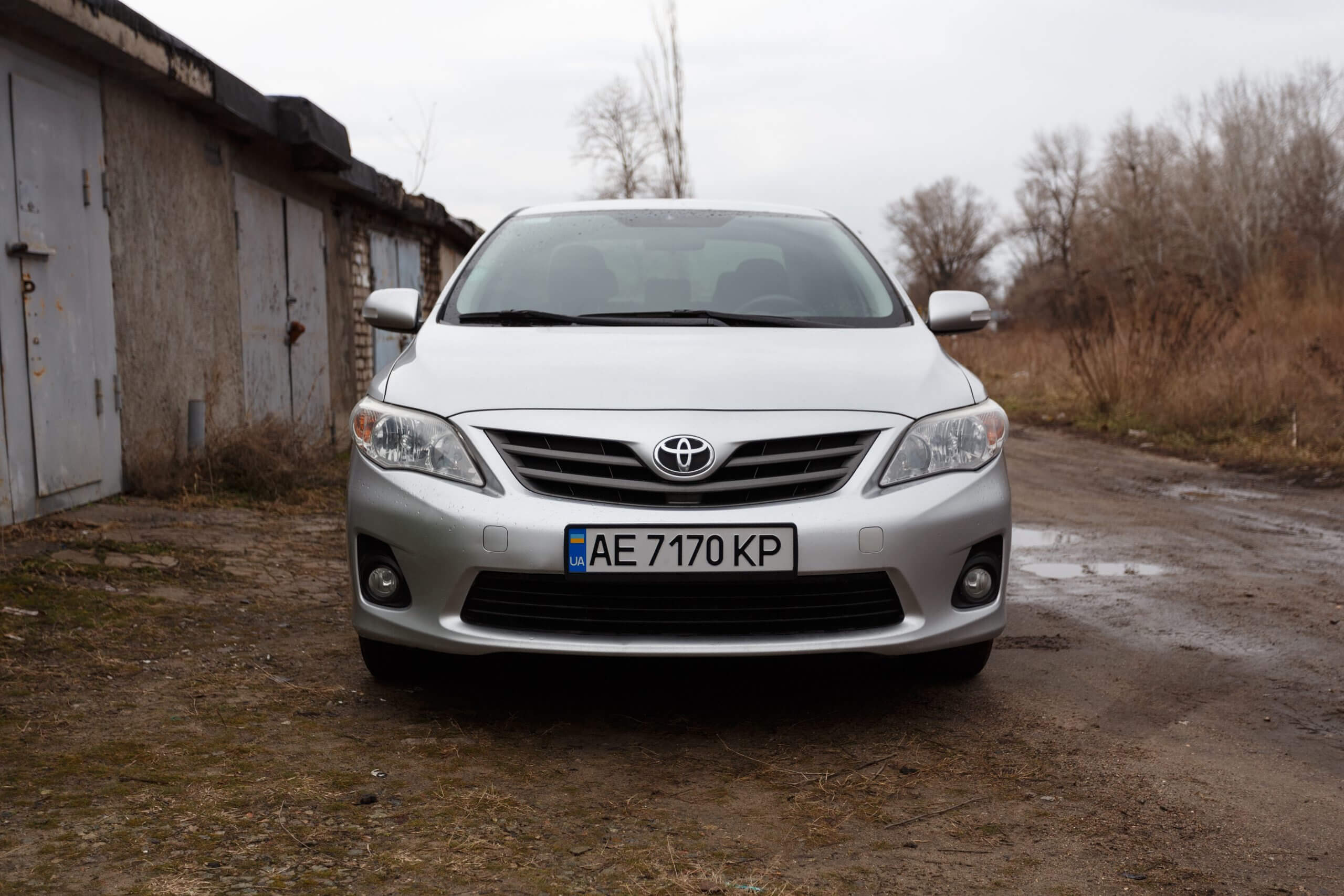
FIXD Reliability Score: 5-7/10
Owner Reliability Score: 7-8/10
KBB Value: $6,011-$6,750
Fuel Economy: 27-29 mpg
Annual Maintenance/Repair: $482-$825
Safety Rating: 4-4.6 / 5
The 2010 Toyota Corolla is the second car of the 10th generation, and it improves significantly from 2009. The 2010-2012 Toyota Corolla has high owner survey scores and low yearly repair costs.
Owner surveys give the 2010 and 2011 Corollas a score of 8 out of 10, which keeps it in the upper ranks. 2012 scored one point lower at 7/10. FIXD app reliability data is the opposite, giving 2010-2011 a 5 out of 10 and 2010 another 7.
The biggest difference between these three models is the safety data. The 2010 Toyota Corolla has a 4.2 rating, 2011 with an even 4, and the 2012 Corolla tops them both with a 4.6 rating.
Another significant difference between the 2010-2012 Toyota Corollas is the annual repair and maintenance cost. Surprisingly, the oldest (2010) is the cheapest to repair at $482. This repair cost is well below the average across all Corollas and isn’t bad, considering it is over ten years old. The 2011 Toyota Corolla costs $825 to maintain yearly and is expensive compared to the newer models.
The 2010-2012 Toyota Corollas check engine lights are relatively timid. A common code is P1201, which resulted in an alternator replacement in the 2011 and 2012 models. The alternator replacement cost $501 and $912, contributing to 2011’s high repair costs. There is also a slight chance of a DTC P1603 resulting in a charcoal canister replacement ($753-$1000).
The negative side of these years is the high number of recalls between them. The 2010 Toyota Corolla has (a concerning) 17 recalls, with three investigations. Since the manufacturer covers the cost of these recalls, it is worth getting them done to keep driving a reliable vehicle. The 2011 Toyota Corolla has nine recalls, and the 2012 Corolla has five.
The Worst Years of the Toyota Corolla
Picking the worst years of the Toyota Corolla was quite difficult because the surveys indicate that most owners believe the car is reliable. However, a few stand out as the absolute worst years of the Toyota Corolla.
This list was ranked based on the same factors as before, such as FIXD Reliability Score, Owner Reliability Score, Kelley Blue Book value, and more. Again, it is listed from the best of the worst to the worst of the worst.
2009 Toyota Corolla
FIXD Reliability Score: 3/10
Owner Reliability Score: 7/10
KBB Value: $5,785
Fuel Economy: 28 mpg
Annual Maintenance/Repair: $350
Safety Rating: 4.2/5
The 2009 Toyota Corolla is the first car of the 10th generation. It came with a lot of problems, including, a low safety rating, and a low average mpg.
According to the FIXD app engine reliability data, this model only scores a 3 out of 10. However, the owners surveyed gave it a higher ranking of 7 out of 10 for reliability, which indicates that this vehicle is dependable in the eyes of its owners.
The 2009 Toyota Corolla has an unimpressive 4.2 safety rating. The NHTSA gave it four stars out of five in frontal crash rollover rating. A potential buyer might consider the same year in the Honda Civic, which has a 4.6 rating.
The repair and maintenance costs of the 2009 Corolla are surprisingly low, but there is an 89% chance of a repair costing over $500. The pricey repair will likely be in the engine, brakes, or fuel system.
The 2009 Corolla threw many check engine lights, resulting in its low FIXD reliability score. The most common codes in this Corolla are P0304 and P0301; engine misfires in cylinders four and one. The repairs for these codes could be spark plugs or ignition coils, ranging in cost from $20 to $376.
The 2009 Toyota Corolla has an outstanding 13 recalls. These recalls range from airbags to faulty seat heater wiring. While the owner pays nothing out of pocket for these repairs, it is a hassle for a potential owner.
2005-2006 Toyota Corolla
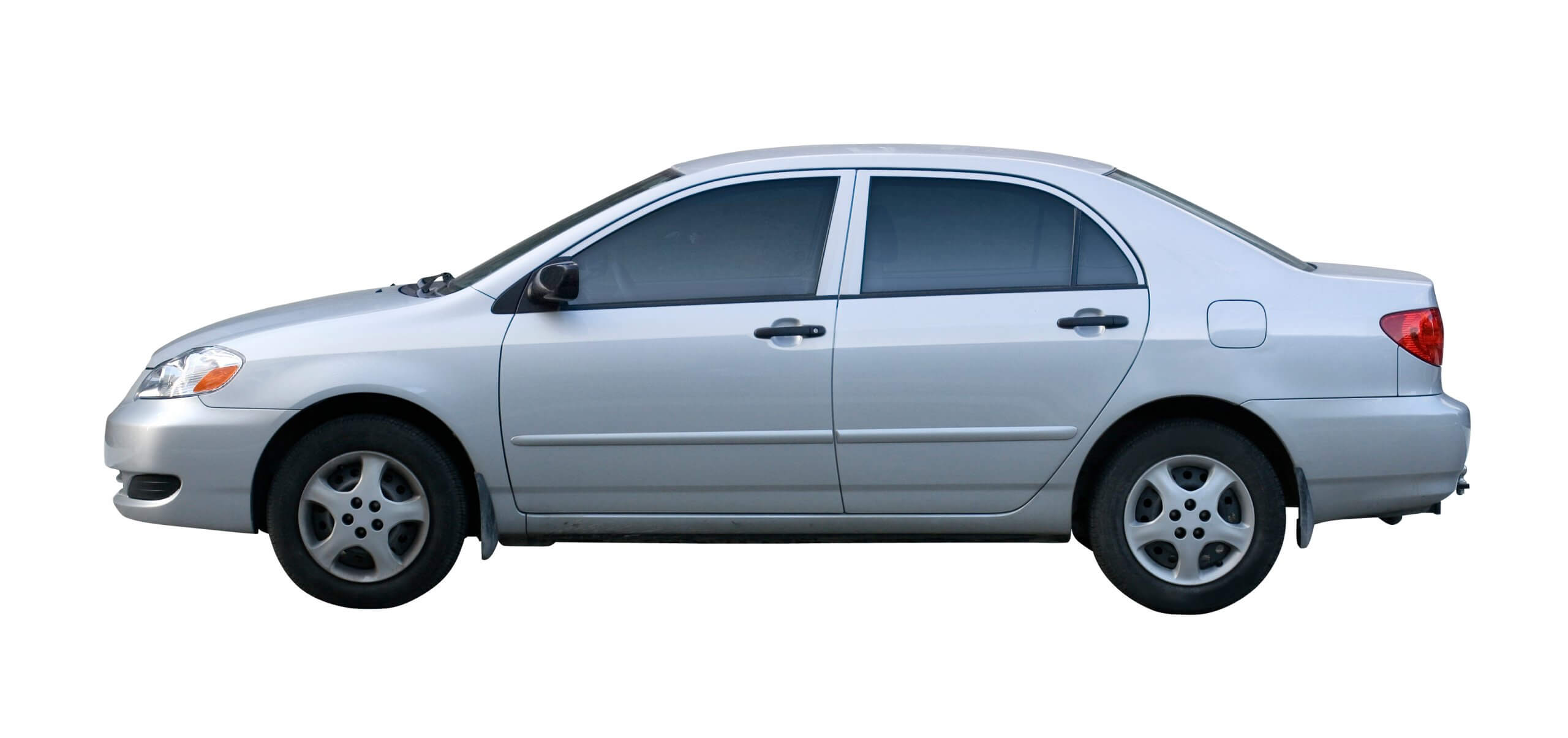
FIXD Reliability Score: 3-5/10
Owner Reliability Score: 6-7/10
KBB Value: $3,353-$4,176
Fuel Economy: 28 MPG
Annual Maintenance/Repair: $617-$631
Safety Rating: 4.4/5
2005-2006 Toyota Corolla is the middle of the 9th generation. It has low FIXD reliability and high maintenance costs.
The FIXD app engine reliability was 3 out of 10 in 2005 and only rose to 5 the following year. Owner-reported reliability was 7 and 6, marking a big difference in the scores for 2005.
Safety ratings for the 2005 and 2006 Corolla are 4.4, which is not bad compared to other cars of the same year. The 2005 Honda Civic also reported a 4.4, while the 2005 Nissan Altima reported 4 out of 5 stars.
The 2005 (94%) and 2006 (82%) models of the Corolla have a high probability of requiring a repair greater than $500. Annual repair and maintenance costs are between $617 and $633. These costs are average among all Corollas but high compared to the models on the best side of things.
There is an almost 10% chance a repair will occur in the transmission, considering that one of the three most common codes in these years is the automatic transmission P0741. This repair can cost over $2,500. Another common engine code is Bank 1 System Too Lean, P0171, which can cost $357-$746 if it needs an intake manifold replacement. These cars also throw the CEL for the Catalytic Converter, P0420. A catalytic converter can be expensive, costing up to $2046.
There are eleven recalls for each 2005 and 2006 Toyota Corolla, and they are both a part of the year range (2005-2008) that required an engine replacement on some models due to faulty soldering. These issues make it easy to avoid these models entirely if you are in the market for a used Toyota Corolla.
2000-2002 Toyota Corolla
FIXD Reliability Score: 1-5/10
Owner Reliability Score: 2-6/10
KBB Value: $1,491-$1,993
Fuel Economy: 29
Annual Maintenance/Repair:$750-$1,438
Safety Rating: 3.6/5
The 2000-2002 Toyota Corollas have dismal reliability scores, low safety ratings, and high annual maintenance and repair costs.
The FIXD app reliability scores from devices in 2000-2002 Toyota Corollas are 1-5 out of 10. Owner reports weren’t much better, scoring 2-6/10. A strange phenomenon is the fairly good FIXD Reliability Score (5/10) of the 2001 model, which simultaneously has the lowest owner score of all Corolla model years on our graph (2/10).
Considering the Toyota Corolla is mainly a family vehicle, a potential owner would want to avoid these years based on the safety rating. 2001 Corolla has an abysmal score of 3.6, while the same model year of the Honda Accord has a respectable 4.8.
Repair bills for the 2000 Toyota Corolla top the list at $1,438. The 2001 model is the lowest of the three at $750, which is still above average, and the 2002 rockets again to $1,100. These cost almost as much to own for a year as they are worth.
Another determining factor in landing on the worst side is the long list of trouble codes. Each year has a Bank 1 System Too Lean, P0171, resulting in the replacement of the mass air flow sensor ($172-$309). We also received plenty of check engine lights from these years registering as P0420, or a catalyst efficiency below threshold. P0420 typically resulted in replacing the catalytic converter, costing $1,538-$2,041. Many of the 2001 and 2002 models also reported a code for the evaporative emissions, P0446.
There are 15 recalls between these three vehicles. There seems to have been an issue with the strut mounts on all three years, while there are multiple recalls relating to the reflectors. The 2000 Toyota Corolla has six recalls, and the 2001 Corolla has four. 2002 Corolla has five recalls, one investigation, and a whopping 148 complaints.
1996 Toyota Corolla
FIXD Reliability Score: 1/10
Owner Reliability Score: 4/10
KBB Value: N/A
Fuel Economy: N/A
Annual Maintenance/Repair: $1,375
Safety Rating: 4
The 1996 Corolla has the lowest FIXD score of 1 out of 10, but owners gave it a generous 4/10. This score might be because owners believe any car still driving this long to be highly reliable.
The NHTSA provides this model with four stars out of five. There is a 100% chance you’ll have a repair costing over $500 in this car, and it averages $1,375 for yearly upkeep. One could easily argue that this makes the 1996 year a terrible choice to purchase if you are looking for a cheap and reliable used car.
These repairs are related to a variety of DTCs this model has reported. One reoccurring code is P0133, an oxygen sensor issue that could require up to $306 to repair.
The 1996 Toyota Corolla car has six recalls concerning struts, lights, and fuel throttle. The manufacturer may cover these costs.
FAQs
What years of the Toyota Corolla have engine and/or transmission problems?
While Toyota prides itself on its dependable engines, all vehicles have a chance of needing a major repair. However, most reports of the Toyota Corolla engines are positive, with only older models requiring an engine repair costing over $500.
Specific 2005-2008 models were recalled regarding a manufacturing defect that may cause some solder points on the engine to crack under strain.
Toyota Corolla owners report rough shifting and slipping gears in the 2011 and 2012 models, with over 10% of FIXD owners with these vehicles saying the transmission caused an over $500 repair. There is only one recall for Toyota Corollas regarding the transmission in the 2019 model. This recall is to replace the CVT and torque converter due to a pump blade that may detach.
What is considered high mileage for a Toyota Corolla?
Toyota engines are famous for their ability to withstand high mileage and keep running. However, every car is maintained and cared for differently. Individual inspection is necessary to determine if a car has too many miles.
While 18% of Corolla owners believe their car will make it past 200,000 miles, the average mileage of Corollas with a FIXD sensor is 142,000 miles.
Do any hybrid years have problems?
The first Toyota Corolla hybrid for the United States was introduced in the 12th generation, with the first model in 2020. Most owner reviews and opinions are generally optimistic about this vehicle.
Since it has only been around for about four years, reports of significant issues or problems are limited. However, with more time and as the hybrids on the road gain more miles, any underlying issues will begin to reveal themselves.
A common complaint of the hybrid Corolla is that the battery loses power when the vehicle is unused for a while. If you don’t drive it daily or go on an extended vacation, there is a chance you’ll have to get the battery inspected.
The 2020 Corolla hybrid also had two recalls, one of which caused the loss of stability control and brake assist. They fixed the problem by replacing the brake booster, so if you’re considering this vehicle, make sure the repair has been completed.
What other vehicles should I consider?
While the Toyota Corolla is an excellent vehicle choice based on this data, there are other models you should consider when purchasing a used vehicle.
One car that’s worth taking a look at is the Honda Civic. Like the Corolla, the Civic is a well-established compact sedan known for its reliability and fuel efficiency. However, it also offers a sportier driving experience than the Corolla, with more engaging handling and a more powerful engine.
Another car to consider is the Kia Forte. Like the Corolla and Civic, the Forte is a compact sedan that offers excellent value for money, with plenty of features even in its base trim levels. The Forte also has an excellent warranty, which should give you peace of mind if anything goes wrong.
If you want something larger than a compact sedan, check out the Ford Fusion. This midsize sedan is known for its comfortable and refined ride and its high-tech features. In addition, it comes with various powerful and efficient engine options, including hybrid and plug-in hybrid variants.
What owners of the Toyota Corolla like to use their car for:
Most owners use their Toyota Corolla for lots of driving, with 43% reporting they use it mainly for travel or a long commute. The subsequent main use for the Corolla is as a family vehicle, at 31%. Less than 10% of drivers use it for anything else.
| Frequent Use Categories: | How Useful? (Out of 5 Stars) |
| Family Vehicle | **** |
| Lots of Driving (travel/long commute) | ***** |
| Hauling/Towing | * |
| Office on Wheels | * |
| Sport/Fast Driving | * |
| Luxurious Driving | * |
| Outdoor/Off-Road | * |
A Note About Data and Information Sources
This article has many details about Toyota Corolla reliability; here’s what we used for our assumptions and recommendations.
- FIXD Reliability Score & Data: Engine reliability information is captured via the FIXD App.
The FIXD Reliability Score is calculated using the number of DTCs per year, weighted by mileage. This is then turned into a scale of 1-10 for easy graphing.
This is an objective score.
- Owner Reliability Score & Data: This data is the result of surveying Toyota Corolla owners who use FIXD.
The Owner Reliability Score comes straight from owners of the Toyota Corolla.
This is a subjective score.
To determine the Owner Reliability Score we ask each car owner:
How reliable would you say your Toyota Corolla is?
a. Just point A to point B driving
b. A Daily Commuter
c. Good for a 100 mile road trip
d. Good for a 500 mile road trip
e. I could take a cross-country road trip, no problem
From here we translate their answers into the Owner Reliability Score:
a. = 2
b. = 4
c. = 6
d. = 8
e. = 10
Keep in mind, owners may think their car is more or less reliable than it actually is.
One potential problem is that people often buy the same make or model they are used to when they go car shopping, just a newer year.
Ford, for instance, has a number of consumer loyalty awards for the Ford F-Series, Ford Mustang, and Ford Expedition.
Car owners may be so loyal to the make or model they currently own that they would have trouble accurately comparing their cars’ reliability to others.
It’s for this reason that we intentionally ask car owners a question that is relative to mileage rather than relative to other cars.
Still, be mindful of the accuracy of these Owner Reliability Scores, people’s perceptions and unconscious blindspots can skew data.
We suggest looking at both the FIXD Reliability Score and the Owner Reliability Score for this reason.
- KBB Value: Average private-seller valuations as supplied by Kelley Blue Book (KBB), based on a Toyota Corolla with typical mileage for that respective model year.
- Fuel Economy: Mileage-per-gallon estimates according to the U.S. Department of Energy
- Annual Maintenance/Repair: Upkeep expenses as reported by surveyed Toyota Corolla owners
- Safety Rating: Crash test data collected and reported by NHTSA. We average all ratings for each year to come up with a simplified, average safety score. This makes it easier to look at on a graph.
References
- Toyota Corolla model-specific information, edmunds.com (various dates). Retrieved April 7, 2023, from https://www.edmunds.com/
- Model-specific recall information as per the National Highway Transportation Safety Administration. Retrieved April 7, 2023, from https://www.nhtsa.gov/recalls
- What warranty coverage do I have on my Toyota vehicle? Retrieved April 7, 2023, from https://support.toyota.com/s/article/What-warranty-coverag-7683?language=en_US#:~:text=Basic%20Coverage%20is%2036%20months,by%20Toyota%2C%20subject%20to%20exceptions
- 5 Toyota Corolla Hybrid Problems (November 8, 2022) driversadvice.com Retrieved April 7, 2023 from https://www.driversadvice.com/toyota-corolla-hybrid-problems/
- Toyota Tundra Makes History Towing Space Icon (October 13, 2012) Retrieved April 7, 2023 https://pressroom.toyota.com/toyota-tundra-tow-space-shuttle-endeavour-oct12/

Keith Rollins is a copywriter and author that has been involved in the automotive industry for over 12 years. He has written for hotcars.com and is featured on Copywriting.org. When he’s not writing he’s spending time with his three kids, hiking, working on cars, or running. You can see his work at keithrrollins.com.

